| Reviews & Columns |
|
Reviews DVD TV on DVD Blu-ray 4K UHD International DVDs In Theaters Reviews by Studio Video Games Features Collector Series DVDs Easter Egg Database Interviews DVD Talk Radio Feature Articles Columns Anime Talk DVD Savant Horror DVDs The M.O.D. Squad Art House HD Talk Silent DVD
|
DVD Talk Forum |
|
|
| Resources |
|
DVD Price Search Customer Service #'s RCE Info Links |
|
Columns
|
|
|
Stanley Kubrick's Fear and Desire
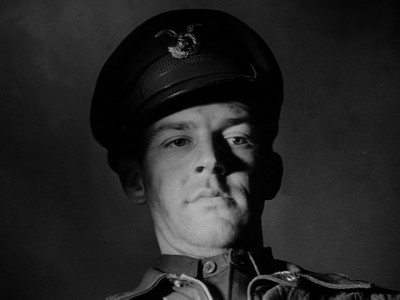
Right at the beginning of the great Stanley Kubrick's very first feature-length film, 1953's Fear and Desire (long disowned by the late director, rarely seen, but now restored and released to DVD and Blu-ray under the auspices of The Library of Congress and Kino Classics), a voice-over makes it clear that we're deep into fable territory: The soldiers' stories that we're about to be told could be from "any war," this voice intones, and what we're about to see exists "outside history." That last could be taken as a bit of self-protective disingenuousness (in 1953, the Cold War was omnipresent, McCarthyism on the rise, and one could say that the film's piercingly despairing, disdainful take on us-vs.-them wartime murderousness is a warm-up for the full satirical treatment of U.S./U.S.S.R. enmity, 11 years later, in Kubrick's Dr. Strangelove). But even taken at face value, this narration may be untrustworthy or ironic; it might be more accurate to say that what unfolds in the following hour actually encapsulates a story eternally recurrent throughout history -- the story of men called upon by other, more powerful, remote and aloof men to set aside or destroy their personal hopes and fears, sanity, moral repulsion toward killing, and very possibly sacrifice their own lives, in the ceaseless theater of war that is human history and that, in Kubrick's view, never offers untainted glory, but always scars, maims, or kills anyone who enters it.

Four military men at war -- the group's leader, Lieutenant Corby (Kenneth Harp); the somewhat sycophantic Private Fletcher (Stephen Coit); Private Sidney (Paul Mazursky, later a well-known film director in his own right), a young man too green and sensitive to handle the gory, amoral exigencies of war; and Sergeant Mac (Frank Silvera), a stoical, philosophical, rebellious potential renegade -- are left six miles behind enemy lines after their plane has gone down and must somehow traverse that treacherous distance, crawling with suspicious foreigners and enemy officers, to get back to relative safety. What they encounter, what they suffer, and what they're compelled to do on their journey, however, render any sense of triumph felt by those who make it back to safety and the "right" side hollow to the point of meaninglessness. That (arbitrary?) line between their territory and the enemy's has been drawn by others, after all, and the sacrifices they've been called upon to make while reinforcing it will irretrievably alter them, undermining and diluting any aspirations they might have had for peaceful, "ordinary" lives. As Private Fletcher inarticulately confesses to his lieutenant at the end, "Somehow, I don't want what I wanted before.... I'm all mixed up. I wish I could want what I wanted before."
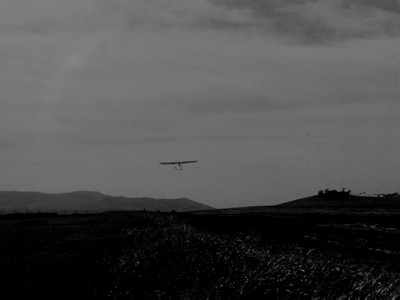
At least Fletcher still has the physical and mental power to articulate his disillusionment; only the two of them have made it back, and they're haunted by the other two -- one gone insane, the other dying of his wounds -- that they've left behind (as in other Kubrick films, from Paths of Glory to >i>A Clockwork Orange to The Shining, the crazy and the dead are persistent specters, responsibilities we can't easily shake). The kill-or-be-killed shedding of blood that Private Sidney has had to endure along the way, coupled with his confrontation with the battle between civilization/ethics and barbaric jungle-law within himself (conveyed in a wrenching, finally tragic scene wherein he's unwisely left to guard a female hostage (Virginia Leith) who inspires equal, contradictory parts lust, empathy, and mother-nostalgia in him), overwhelms him. For his part, Sergeant Mac hints that it was a dissipated, worthless-feeling working-class civilian life that led him to the military, and damned if he's not going to redeem his disempowered existence with one final, unnecessary, and gruesome act of suicidal, self-aggrandizing "heroism," whose ugly, drawn-out, mortally painful consequences were never going to provide the closure and vindication he imagined. Meanwhile, the story draws the men -- particularly Lieutenant Corby and Private Fletcher -- closer and closer to a large country house, first spotted through Sergeant Mac's binoculars, that has been conscripted by the enemy as a makeshift headquarters. It's the old, distinguished-looking general housed within that Mac has fixed on as the valuable target of his suicide mission, but there's something more troubling than their different uniforms about both the general and his supercilious tenant, and it slowly dawns on us that Kubrick is already up to the same refracted-casting trick he would use with Peter Sellers in Lolita and Strangelove: the enemy general and Lieutenant Corby are played by Kenneth Harp, the enemy lieutenant and Private Fletcher by Stephen Coit, and when the poor sergeant with his delusions of grandeur draws enemy fire as a distraction, it's the "good" lieutenant who's left to face and assassinate the opposite number that he may or may not recognize as his own spitting image.
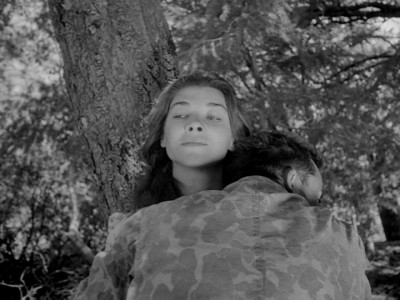
It's heady stuff, but even at this early stage and working in a much more explicitly allegorical mode than he ever would again, Kubrick entrusts the meaning and power of the film to the images, the pacing, the structure, showing and not telling, and never winking-nudging us or cheating with lame exposition or hamfisted bluntness to get us involved in and thinking about the fate of these men and its implications. Working from a script by Howard Sackler (who also worked with Kubrick on his next film, Killer's Kiss), Fear and Desire was "directed, photographed, and edited" by Kubrick, and the auteur is well on his way here to attaining the uncanny visual exactitude -- the sort of heightened photo-iconography -- for which he would later become legendary. The oddly preoccupying presence of the enemy general's sleek black hound; the too-close, sharply composed shots of the carnage-aftermath of gunfire and stabbings; the ominous-looking shadow and light used to create a maniacal portraiture of men like the lieutenant and the general, who delusionally, incompetently, or jadedly hold the lives of others in their hands -- all these touches are thrilling, pure Kubrick, despite the sometimes apparent low-budget technical limitations (most notably in a few choppy edits and, particularly, in the majority of the dialogue being post-synced, though with enough skill that it's not too distracting). Gerald Fried's coolly plaintive score, like something out of Through A Glass Darkly, serves also to highlight the similarities between some of the film's compositions and those in Bergman's contemporaneous works, while certain other framings and subtleties of lighting are reminiscent of the poetic realism of Renoir and Carné: On his way to finding his own inimitable voice, Kubrick was clearly learning from the best.
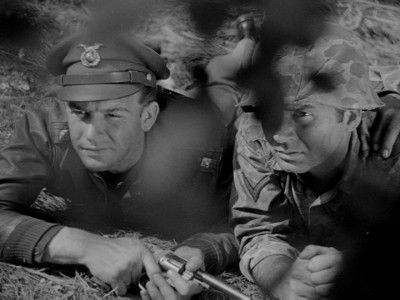
In its tortured moral sense, grim irony, and slow-building, maximized-intensity visual and tonal stylings, Fear and Desire is recognizably Kubrick's, a film that rivets and enthrals even as it bends your mind. It does have a slightly rough, touch-and-go quality in parts, and it obviously predates the progressively increasing immaculateness of some of Kubrick's later works (there are even a number of those -- this reviewer definitely not included -- who prefer the looser "liveliness" on display here and in other early Kubrick to the intimidatingly perfect orchestrations of everything from 2001 on), but it's far more than an interesting failure or mere curiosity. Like that legendary vault-ridden demo by a favorite band or that great lost manuscript by a revered author, it's both a snapshot of a unique and acute sensibility in the joyous throes of development and a work that stands on its own not-inconsiderable merits, charms, and accomplishments. Everybody has to start somewhere, but despite Kubrick's later insistence on striking it from the preferred version of his resumé, there's absolutely nothing to hide or be ashamed of in Fear and Desire; it stands as a fine, striking beginning, indeed, and one that well deserves its new re-inclusion in the master's oeuvre.
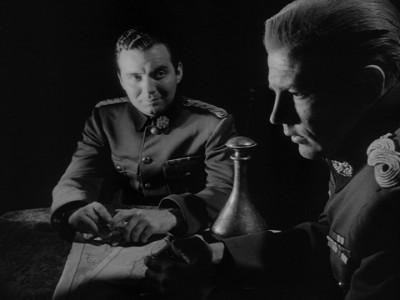
THE DVD:
Using a Library of Congress restoration, the transfer for this presentation of Fear and Desireis very nice; though you can certainly tell that its original elements were somewhat worn, and there are some instances of classic old-print flicker, it's a remarkably clean job, preserving as much as possible the film's often striking visual beauty, with no discernible edge enhancement, aliasing, or other compression artifacts. While digital noise reduction may have been overly relied-upon in spots, there's a good overall retention of texture-giving celluloid grain.
Sound:The disc's Dolby Digital 2.0 soundtrack does an excellent job of conveying the film's original mono sound, which is in surprisingly good shape and unexpectedly accomplished, considering the technical limitations Kubrick was working with (the main aural anomaly to be noted is the preponderance of well-done but noticeable post-synced dialogue, which is part and parcel of the source material, nothing to do with the disc authoring). In short, all due care has been taken in mastering the sound for home viewing.
Extras:The Seafarers, an industrial-type film Kubrick made on commission from The Seafarers International Union. With the sound on, it's little more than a half-hour commercial-documentary for the union and its promise of solidarity, protection, a fair shake, and good pay/benefits for honest work (most of which, I will admit, made my lefty heart soar a little bit). But if you turn the sound off or tune it out, you can see Kubrick using the opportunity to hone his craft (this was the first motion picture Kubrick ever made using color); a relatively long track at the Seafarers cafeteria looking, for example, looks and feels particularly Kubrickian. An excellent supplement for a disc whose main content has already fulfilled the promise of revealing the fascinating origins of one of the great filmmakers.
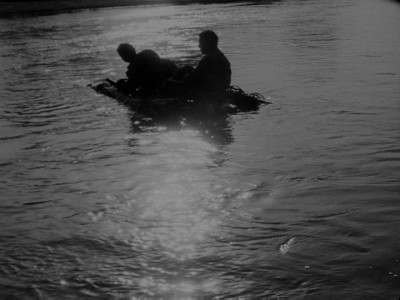
It's a testament to Stanley Kubrick's notorious perfectionism that he disowned and suppressed Fear and Desire, his 1953 debut feature; as this long-anticipated home-video release finally lets us see, the film, while imperfect, is vital, dazzling, lean, and powerful -- something a filmmaker less unforgivingly exacting and obsessive than Kubrick would be proud to have accomplished right out of the gate. Not so much a war story as a deeply troubled riff on humankind's seemingly permanent warlikeness and the devastating consequences, it hits the ground running, imbuing its tale of four soldiers stuck behind enemy lines with a rather finely crafted aura (despite the low-budget technical limitations) redolent of both the best Twilight Zones and Bergman, never letting up on the mounting tension and eerie archetypicality of its characters (Kubrick is already having his actors play multiple roles) until the haunting, uncompromising conclusion. While it's true that Kubrick would later "mature" and sublimate the allegorical and archetypal fascinations, overt in Fear and Desire, that would run through his entire filmography and make for even more intense, indelible experiences, it shows him well on his way to the mastery that would, after two more increasingly well-realized achievements, announce itself once and for all with Paths of Glory in 1957. A rough but brilliant first time out for one of the cinema's most towering, controversial, and divisive artists, it's a treasure only the ultra-demanding Kubrick would have seen fit to bury -- a film that most Kubrick devotees and movie-lovers in general are bound to view much more generously and appreciatively than its famously demanding creator. Highly Recommended.
|
| Popular Reviews |
| Sponsored Links |
|
|
| Sponsored Links |
|
|
| Release List | Reviews | Shop | Newsletter | Forum | DVD Giveaways | Blu-Ray | Advertise |
|
Copyright 2024 DVDTalk.com All Rights Reserved. Legal Info, Privacy Policy, Terms of Use,
Manage Preferences,
Your Privacy Choices | |||||||













